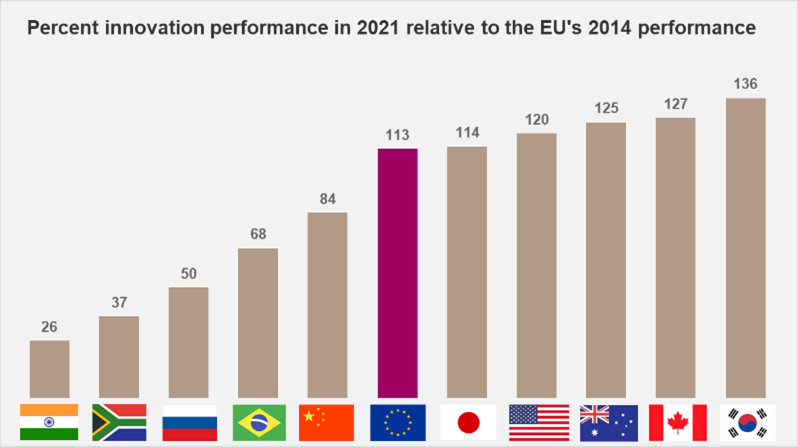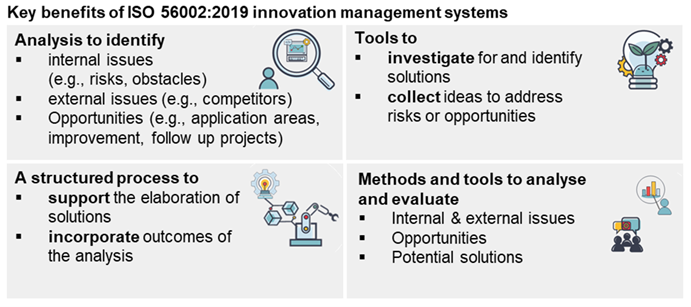Innovation management in H2020 and Horizon Europe projects – More than just IP protection
18th January 2022 at 5:26 pm
The EU is lagging behind in innovation
The European Commission (EC) recently published the Innovation Scoreboard 2021, a comparative analysis of innovation performance in EU member states, other European countries, regional neighbours and global competitors.
The report provides insights on the performance of the European innovation ecosystem, such as the strong growth in Estonia (+34.4%), Cyprus (+33.0%) and Lithuania (+30.9%) relative to their performance in 2014. However, it also reveals that several countries and the EU`s main competitors are exceeding its performance (Figure 1) and that especially Japan and the United States are spending a larger percentage of their GDP on Research and Development.

Closing the gap between Europe and its competitors
Key measures of the EU to promote innovation in Europe have been the Framework Programmes for Research and Innovation, the world’s largest research and innovation funding programmes to date. Indeed, the outcomes of projects funded by the 2014-2020 Framework Programme Horizon 2020 and by its successor for 2021-2027, Horizon Europe, are considered crucial for the performance of the European innovation system. Alongside other measures to excel in innovation, the implementation of innovation management tools and techniques is considered as a powerful means to maximise the impact of innovation expenditures.
New ISO norm for project management
In 2019, the International Organization for Standardization (ISO) published the standard 56002:2019 for the management of innovation,[1] providing guidelines for the establishment of innovation management systems and a vocabulary defining frequently used terms.
According to the standard, anything that is novel and realises value is an innovation, from tiny improvements in existing products to radically new manufacturing processes or services. Therefore, the innovation is the outcome of the process. Obviously, the protection of IP plays an important role in the management of innovation. The standard demands the establishment of an IP inventory, the monitoring of external intellectual property assets and the evaluation of formal protection options. But the process defined in the standard covers much more. The start of it is the identification of opportunities. To do so, an organisation needs to analyse the area it is operating in as well as its internal context, such as processes or intellectual property (IP). Therefore, an extensive part of the innovation management involves the use of analytical methods, such as risk analysis and benchmarking. Based on the insights gained through these methods, the organisation has a strong foundation to decide on areas for innovation activities and to define specific initiatives. These may be very specific, for example to reduce the waste produced during the manufacturing of a product, or quite general to capture as many ideas as possible. Ideally, innovation management involves individuals as diverse and from as many backgrounds as possible, to profit from their varied backgrounds. As many are familiar with the importance of IP protection.
Benefitting from ISO in Horizon Europe projects
We at accelopment consider professional innovation management as key to successful EU projects as it is a key step to help ensure that research results generated in these projects are further used for commercial and non-commercial purposes. We believe that innovation management can contribute towards achieving the project objectives, can facilitate the exploitation of results and enhance the expected impacts of a project. Based on our experience as Innovation Manager in several EU projects, we find the ISO 56002:2019 as a valuable standard to follow and see it as complementary to the (administrative) project management in Horizon Europe research and innovation projects. Some of the key benefits of innovation management systems are illustrated in Figure 2

Our EU project management and communication experts have been supporting the implementation of innovation management related strategies and measures as part of the dissemination and exploitation activities in FP7 and H2020 projects such as Robo-Mate and H-DisNet. More recently, we have started developing a toolbox for innovation management for use in collaborative projects, namely Research and Innovation Actions, Innovation Actions and Coordination and Support Actions, in Horizon Europe projects.
If you are interested in implementing innovation management in your ongoing or planned Horizon Europe project, we would be pleased to hear from you.
References
European Innovation Scoreboard 2021 (2021), p.31, Publications Office of the European Union. https://doi.org/10.2873/725879
Innovation Management and the knowledge-driven economy (2004), Publications Office of the European Union. ISBN 92-894-7408-4
Innovation management – Innovation management system – Guidance (2019), International Organization for Standardization. ISO 56002:2019

